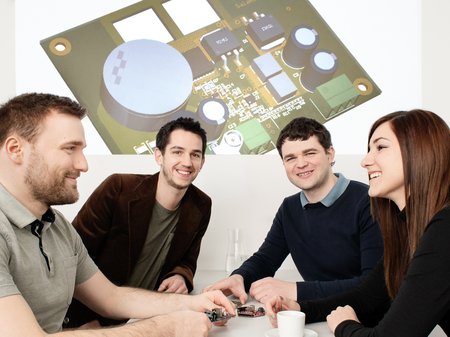Integrated in the Embedded Systems Division, SAL's Edge Computing & Distributed SW research unit is dedicated to the development and operation of dependable embedded systems with a special focus on edge computing. With their local computations and environment interactions "at the edge", such systems form the backbone of distributed embedded sytems and contribute significantly to their efficiency, effectiveness and dependability. Complementing architectural questions concerning partitioning and interaction with the environment as well as the implementation in soft- and hardware, dependability is a major concern in order to ensure that the system indeed lives up to our expectations.
"We strive to make science happen in the real cyber-physical world - enabling the necessary computations and interactions in an embedded context where they are needed. Our mission is to enable all this in a dependable way at the edge of information and computing resources - from simple things and nodes to gateways and high-level control - while remaining outside the cloud, but possibly using it as a fallback", illustrates Ingo Pill, Senior Scientist for Dependable Embedded Systems.
The Edge Computing team is growing
The unit is led by András Montvay who can draw on more than 20 years of experience in getting innovation on the road. Before joining SAL in July 2020, András worked in industrial R&D for over two decades, developing various systems in consumer electronics, medical and automotive applications, ranging from multimedia home networks and wearable telemedicine to combustion engine control and vehicle instrumentation. Besides his technical background, András has gained international leadership experience, in his most recent position leading 180 employees as director of engineering of an automotive supplier`s business unit.
Ingo Pill joined SAL in September 2020 as Senior Scientist for Dependable Embedded Systems. He holds an MSc and PhD degree in Computer Science from TU Graz (curriculum Telematik), and before joining SAL Ingo worked as senior scientist in the Software Engineering and Artificial Intelligence group of Prof. Wotawa at TU Graz.
Jakub Breier also joined SAL in September 2020 as Senior Scientist for Embedded Security. He obtained his Bc and PhD degree in Computer Science from Slovak University of Technology in Bratislava, and his MSc in IT Security from Masaryk University in Brno (Czech Republic). Before joining SAL, he was a Cybersecurity Research Lead at HP-NTU Digital Manfuacturing Corporate Lab in Singapore.
Manuel Freiberger joined SAL in November 2020 as Staff Researcher for Embedded Systems. Previously he worked at Anton Paar where he developed algorithms and firmware for dynamic-light scattering instruments (measuring the particle size) or atomic force microscopy (measuring topology and surface characteristics in the nanometer regime), for example. He holds an MSc and PhD in Eletrical Engineering from TU Graz.
Edi Muskardin is working on his PhD thesis in our SAL Doctoral College. He summarizes his research as “AI meets Formal Methods” and explains further: "By formal methods we understand the logic and mathematical representation of a system to interpret and explain the behavior of an AI agent/deep neural network. Automata Learning helps us to better understand what a machine component has actually learned. We hope that formal methods will lead us one step closer to the Explainable AI."









